AUGIE “THE BANKER” CIAMINO
Airdates: February 9th and June 29th, 1961
Written by Adrian Spies
Directed by Stuart Rosenberg
Produced by Herman Hoffman
Director of Photography Charles Straumer
Special Guest Star Keenan Wynn
Co-starring Will Kaluva, Sam Jaffe, Lee Phillips
Featuring Harry Dean Stanton, Bernard Kates, Rebecca Welles, Bernie Fein
“More than anything else the war between Eliot Ness and the ganglords was a war over the Prohibition era’s most prized liquid asset: alcohol. By 1931, with a series of slashing raids on secret distilleries, it looked as though the Untouchables were actually managing to dry up the arrogant, illegal, multi-million-dollar racket. But the nimble minds of the underworld kingpins were to regroup their angry forces. With shocking speed, the underworld bosses found another way to get their whisky made. Taking advantage of the poverty and the desperation of many immigrant families during those depression days, the racketeers had devised a home still that could be put together for less than three dollars. The man picked to run this new illicit empire was Augie Ciamino, absolute boss of Chicago’s Little Italy. In a short time, his home-cooker operation was canceling out the Untouchables’ gains. Whisky flowed from a thousand tenement kitchens. Ciamino spent most of his time counting profits—until the night of August 16th, the night of a street festival on Haver Street.”
Augie Ciamino (Keenan Wynn) runs the Central Bottling Company producing root beer by day and assorted spirits by night, cooked up by local immigrant families in small lots. When a batch of bad whisky turns up and its maker is found murdered, Ciamino’s operation falls under the scrutiny of Eliot Ness.
Trying to poke a hole in Ciamino’s armor, Ness addresses a night school, class and leaves his telephone number. Ciamino’s stooges wait for him to leave and beat up the teacher for encouraging the immigrants, some of them under Ciamino’s thumb, to attack their master. The only one to intervene is
Renzo Reineri (Will Kaluva), whose son, Paul (Lee Phillips), is Ciamino’s bookkeeper. Reineri orders his son, an otherwise decent young man who had difficulty finding a “real job,” to quit Ciarnino and keep the books for bis small bakery. Paul reluctantly agrees but advises his father that it will take some time to put Ciamino’s books in order.
Meanwhile, Ness has found an ally in neighborhood grocer Luigi Valcone, (Sam Jaffee), who tells what he knows of Ciamino’s operation. The whisky is brought to Valcone’s grocery in root beer bottles that appear to be empty, but are in fact full and capped low in the neck with wax plugs. The watchful Ciamino soon learns of Valcone’s deception and arrives to poison him with bad whisky. The assault leaves the grocer blind and disturbs Reineri to the point of action.
Ness invades the Central Bottling Company but finds that Ciamino has gotten rid of the evidence. Goaded by his arrogance, an annoyed Ness takes an ax to one of Augie’s root beer vats. After Ness leaves the plant, a furious Renzo Reineri telephones his son and advises him that he has broken into a locked cabinet and taken Ciamino’s books to turn them over to Ness. Ciamino, nearby, hears much of the conversation and forces Paul, at the point of a gun, to tell his father to wait for him to come home. Knowing that they will surely kill his father, Paul calmly advises him to wait, then screams a warning to his father instead of hanging up the phone. Paul is then shot to death while his father listens.
On the street, running for cover and clutching Ciamino’s account books, Reineri converges with Ciamino and Ness in an alley. Following an exchange of gunfire, Ciamino, out of ammunition, surrenders. Reineri turns the books over to Ness advising him that his son, “a good boy,” would have grown to become a good man. Ness promises Reineri that the books would be put to good use.
”Eliot Ness used the books very well indeed. The information they contained sent Augie Ciamino to the federal penitentiary for life and smashed one of the most profitable bootleg operations in all history. But it could never have happened without the help of Renzo Reineri, citizen.”
REVIEW
A brilliant piece of work, superbly written, this installment was widely criticized for its portrayal of yet another Italian gangster. Easily the episode with the most ethnic flavor of any in the series, underscored by a slightly campy, but highly appropriate secondary background theme of Neapolitan origin, the Ciamino story is made memorable by the outstanding performances of Sam Jaffe, Will Kaluva, and Lee Phillips. But it’s Keenan Wynn who steals the hour with his despicably viperous Augie Ciamino.
Originally appearing as Ness’ right-hand man Joe Fuselli in the Westinghouse drama, Keenan Wynn returns as the mercilessly arrogant and relentlessly vicious titular character. Ciamino pours bad whisky down an old man’s throat to teach him a lesson on loyalty. He rips phones from walls and grabs frightened women by their hair. There is nothing Augie Ciamino does that isn’t extraordinarily nasty. He is the sort of character The Untouchables set out to eliminate at the rate of one per week.
The hour is full of captivating, poignant, and colorful moments. The relationship between Renzo Reineri and his son Paolo, whom “he now calls Paul,” is well developed in a few, relatively brief scenes and masterfully sets up the viewer for the emotional crash by the time Paul is cut down warning his father to run for his life. When Paul’s wife is assaulted by Ciamino shortly thereafter, instead of cutting away the scene lingers a moment as her daughter comforts her, letting the audience absorb the awful effects of Ciamino’s wrath.
Earlier, in the bottling plant raid, Ciamino taunts luckless federal agents with “What’s the matter, Mr. Ness? You don’t like root beer?” The laughter from the Ciamino camp moves Ness to take an axe to one of Augie’s vats. Root beer pours forth in an imaginative twist to an oft-played scene that made this television series famous.
In the end, with Reineri nearly rescued, a snarling Ciamino warns Ness that if he comes any closer, he’ll kill him, menacing him with an empty pistol.
“You won’t kill anybody, Ciamino – they only hold six,” Ness advises.
(His confidence is well-placed; Augie has fired seven times.)
As an episode in the Untouchables canon, Augie “The Banker” Ciamino is the most pro-immigrant episode for a show ironically under fire for its portrayal of ethnic groups. (It’s also worth pointing out that much of the creative team behind The Untouchables, were either immigrants themselves or direct descendants and extremely proud of it.) It clearly establishes the immigrants as charming and reputable, worthwhile contributors to society, dedicated to their families, and victims to gangsters whose only allegiance is to crime.
Renzo Reineri’s agony over his son’s affiliation with Ciamino, witnessed by Paul’s wife as she lingers in the background, is sincerely felt. Renzo has sacrificed too much to lose his son to hoodlums, even if he is only a bookkeeper. “Put the stinking books in order,” Renzo pleads. “And your life my son, put that in order, too.”
There are many heroes in this story, all of them Italian, a point completely lost on the program’s critics. Despite the quality of this episode on every count, from script to direction, from casting to photography and editing, Augie “The Banker” Ciamino was the proverbial brick through the stained glass window, and it would cost the series its principal sponsor and banish imaginary Italian gangsters.
WHERE THERE’S SMOKE, THERE’S NO CHESTERFIELD
Less than a month after the track had been cleared of the wreckage from The Big Train, the Ciamino story rubbed garlic salt into the festering “Italian problem.” The long feud – which had first simmered over the use of the name and likeness of Al Capone in the original Westinghouse film and flared up over the portrayal of the mafia in A Noise of Death, was fast approaching a precipice.
On Thursday, March 9th, one month after bad Augie ran amok over his fellow countrymen, the Federation of Italian-American Democratic Organizations delivered a line of 200 angry picketers in front of ABC headquarters on West 66th Street in New York. Burly laborers, some with their wives and daughters in tow, carried signs demanding the network cancel The Untouchables. Their spokesman was New York State Rep. Alfred E. Santangelo, but it was Anthony “Tough Tony” Anastasia who rode the event like an electric horseman.
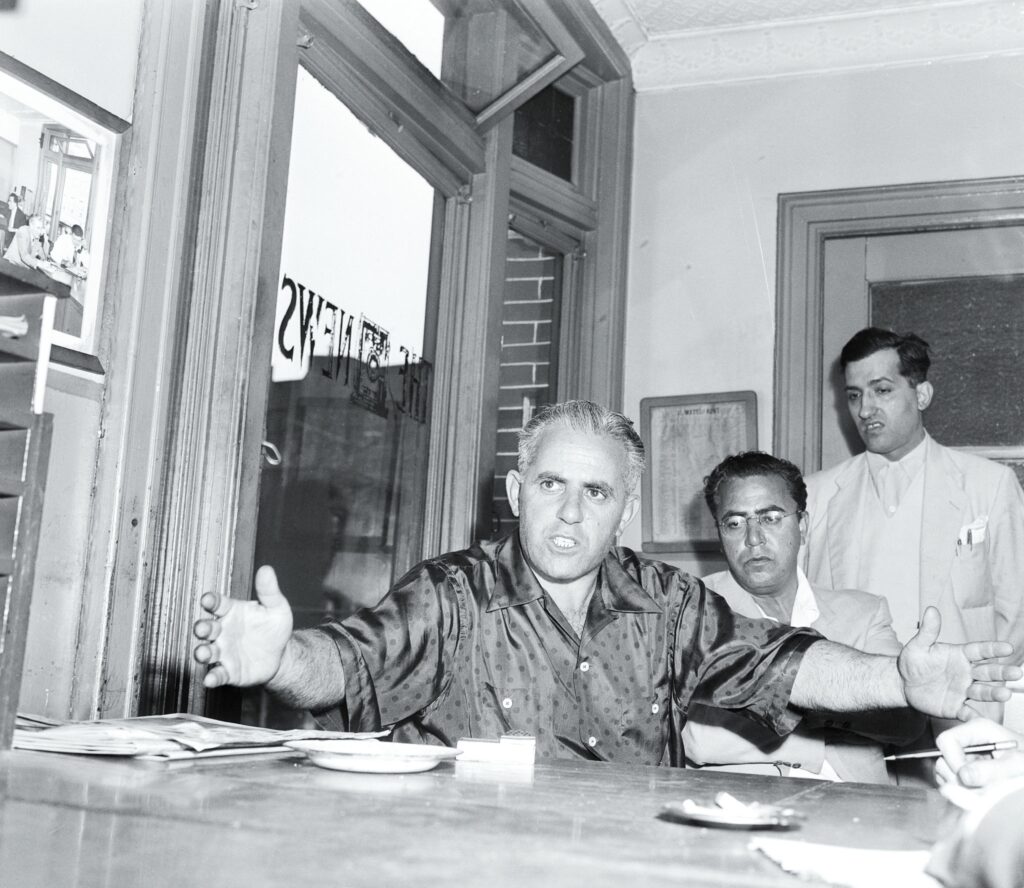
Anthony Anastasia, pictured here in a 1953 photo, instigated the boycott against show sponsor Liggett Myers.
Santangelo, the Italian politician with a large Italian constituency and running for re-election, called for a boycott of all Liggett & Myers tobacco products, including and especially Chesterfield. Tough Tony, one of the notorious Anastasia brothers with ties to organized crime both real and imagined, and labor boss of the Brooklyn waterfront, was less subtle. He threatened to order Longshoremen to stop handling Liggett & Myer’s wares altogether in a New York bark that surpassed Winchell’s.
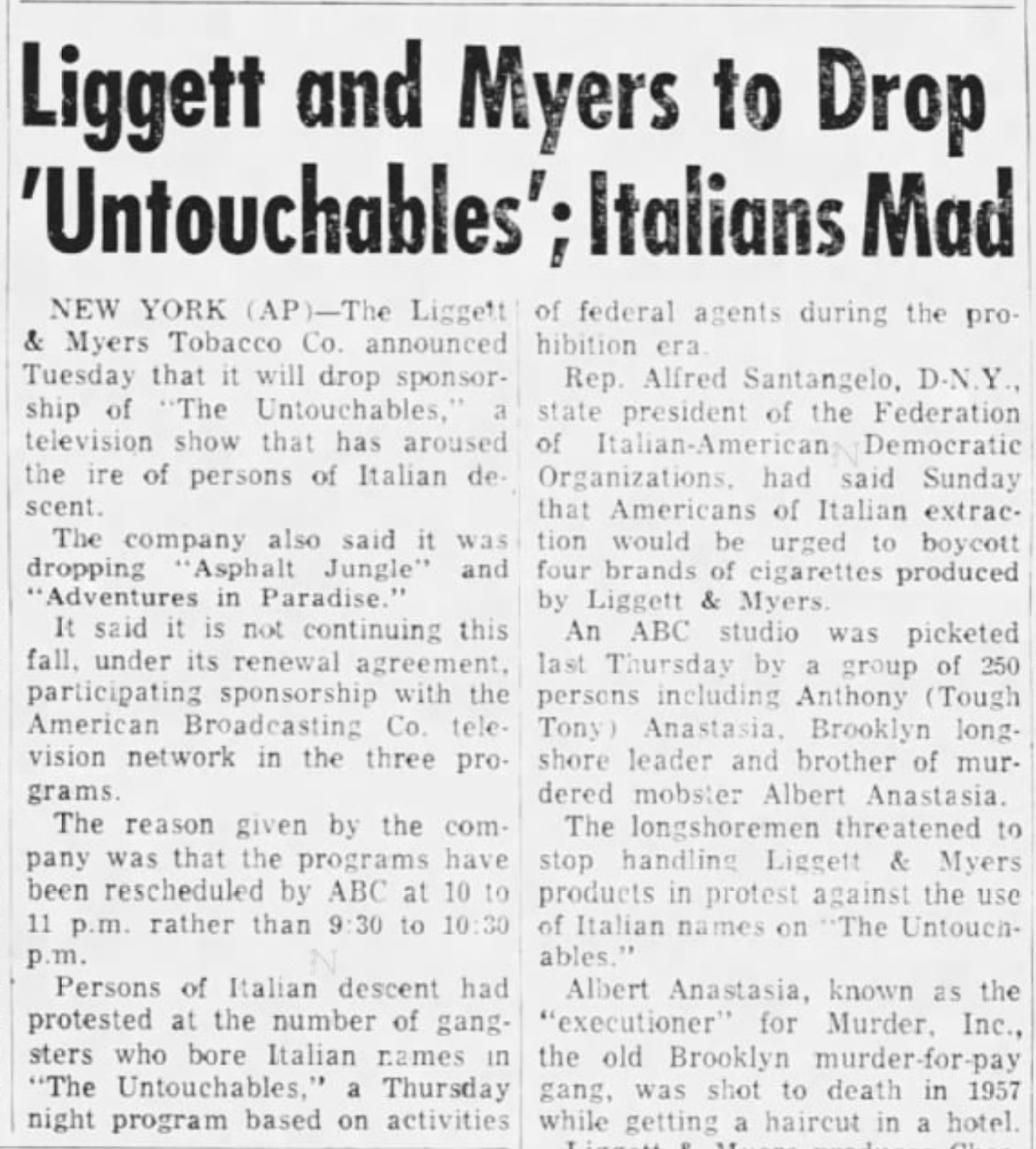
Associated Press, March 15th, 1961.
Liggett & Myers was not amused. The very idea of thousands of cartons of cigarettes parked on the docks – or worse, dumped into the harbor, New England style – created a ferocious image in the minds of the squeaky tobacco executives and the result was immediate. The following Monday, March 13th, the tobacco maker announced that it would not renew its sponsorship of The Untouchables and two other ABC programs, Asphalt Jungle (which hadn’t as yet even aired), and Adventures In Paradise.
Liggett & Myers advertising agency executives tried to save face by denying, predictably, that the move was in any way related to the escalating Italian trouble and instead, blamed the whole thing on ABC for placing their spots in what they called “unfavorable time periods.”
An unfavorable time period indeed. Nielson ratings for The Untouchables had placed the series comfortably in the top ten programs. Not only was Eliot Ness at Number 8, but sales of Chesterfield Kings had risen 12% since the previous year. Liggett & Myers couldn’t take the heat, and Chesterfield was gone.
ABC wasn’t pleased with being singled out for having any such thing as an unfavorable time period, but quietly opened up the Thursday hole to other vendors and had little difficulty filling the vacuum. But the single sponsor identity, so common in the early years of television, continued its slide, and with it, the power of major program sponsors to influence network decisions.
But clearly, something had to be done to please the Italians.
In 1959, The Order Sons of Italy, a pro-immigrant fraternity created to encourage good relations between the United States and Italy, assimilate immigrants and highlight the contributions of Italians, had failed to silence The Noise of Death. UNICO National, another organization comprised of concerned Italians, famously denounced the series with numerous titles: “The Italian Hour,” “Wops and Robbers,” and “Guinea Smoke.” The Order Sons of Italy simply referred to the series as “The Unspeakables.” By early 1961, the outcry against ABC, Desilu, and Eliot Ness had become a chorus.
On March 17th, representatives from the Italian-American League To Combat Defamation, the American Broadcasting Company, and Desilu Productions met in New York and quickly agreed to essentially eliminate fictional Italian gangsters from new episodes and give Nick Georgiade’s character, Enrico Rossi, a more significant role. Desilu also agreed to see that parts were written for law officers with readily apparent Italian ancestry to reverse nearly two years of Augie Ciaminos and Luigi Rinaldos.
The series could still use Italians if the characters met the reasonable criteria of having been real and were now dead. Given the number of once real, now deceased Italian gangsters left on the history books, a fair number would still find their way into the series, but generally, only in bit parts and out of context.
Fictional Italians disappeared following the meeting, but Frank Nitti remained head of the Capone Empire, which more or less remained in control of television’s Chicago. Little else of the agreement materialized.
Ness would encounter and dispatch a great many thugs from less maligned ethnic groups before dealing with Harry Kronman’s The Genna Brothers, a nasty wolf pack whose story – based ever so loosely on the genuine articles – would unfold before the cameras that summer, air in November, and touch off another olive oil fire of their own. Whereas Augie Ciamino had been but a single Italian baddie and made of paper, the Gennas, though real, numbered six.
While concerns about stereotypes and defamation can be meritorious (and in some cases, have managed to persist to television’s modern era, plaguing even HBO’s The Sopranos) protests against The Untouchables now seem to have been opportunistic at best and nearly satirical at worst, especially when considering who the loudest of protests came from: Italians with mob connections themselves.
The greatest fallout from this affair was neither curbing use of Italian names nor the irony of Italian immigrants protesting a television series that was virtually pro-immigrant. Following his divorce from Lucille Ball in 1959, Desi Arnaz was rapidly weathered by the challenges of running Desilu, and he was now personally responsible for peace talks between networks, sponsors, and defamation leagues.
So intimately wrapped up in the affairs of The Untouchables, Arnaz was finding less and less reward in the business of television production.
QUOTES
ROSE RAINERI: “He’s just a little person, papa.”
RENZO RAINERI: “Nobody’s gotta be that little, Rose. Not my son. Not anybody’s son, born under the eye of God.”
RENZO RAINERI: (to Ciamino) You asked me once they teach us in the night school. They teach us that in this country, a man doesn’t have to be afraid of people like you.
OBSERVATIONS
• Screenwriter Adrian Spies had previously worked for Desilu on The Walter Winchell File and handed in several scripts for the Desilu Playhouse, including Lepke and Meeting at Appalachia – both based on their famous, hoodlum counterparts. It’s unfortunate that this episode was his only stop after winning an Edgar Award from the Mystery Writers of America, before an Emmy nomination and an episode of Star Trek.
• Ness forcing Ciamino to listen to Raineri’s brief lecture at the end is a nice touch – and visually amusing as Ciamino tries to end the conversation only to have Ness hold him black and glare him down. Robert Stack and Keenan Wynn continue to have good chemistry.
• The fact that Ciamino doesn’t go down guns blazing makes him a rarity as far as bad guys go. His eventual fate at the hands of justice – and Raineri’s sacrifice to get him there – are then made all the more poignant.


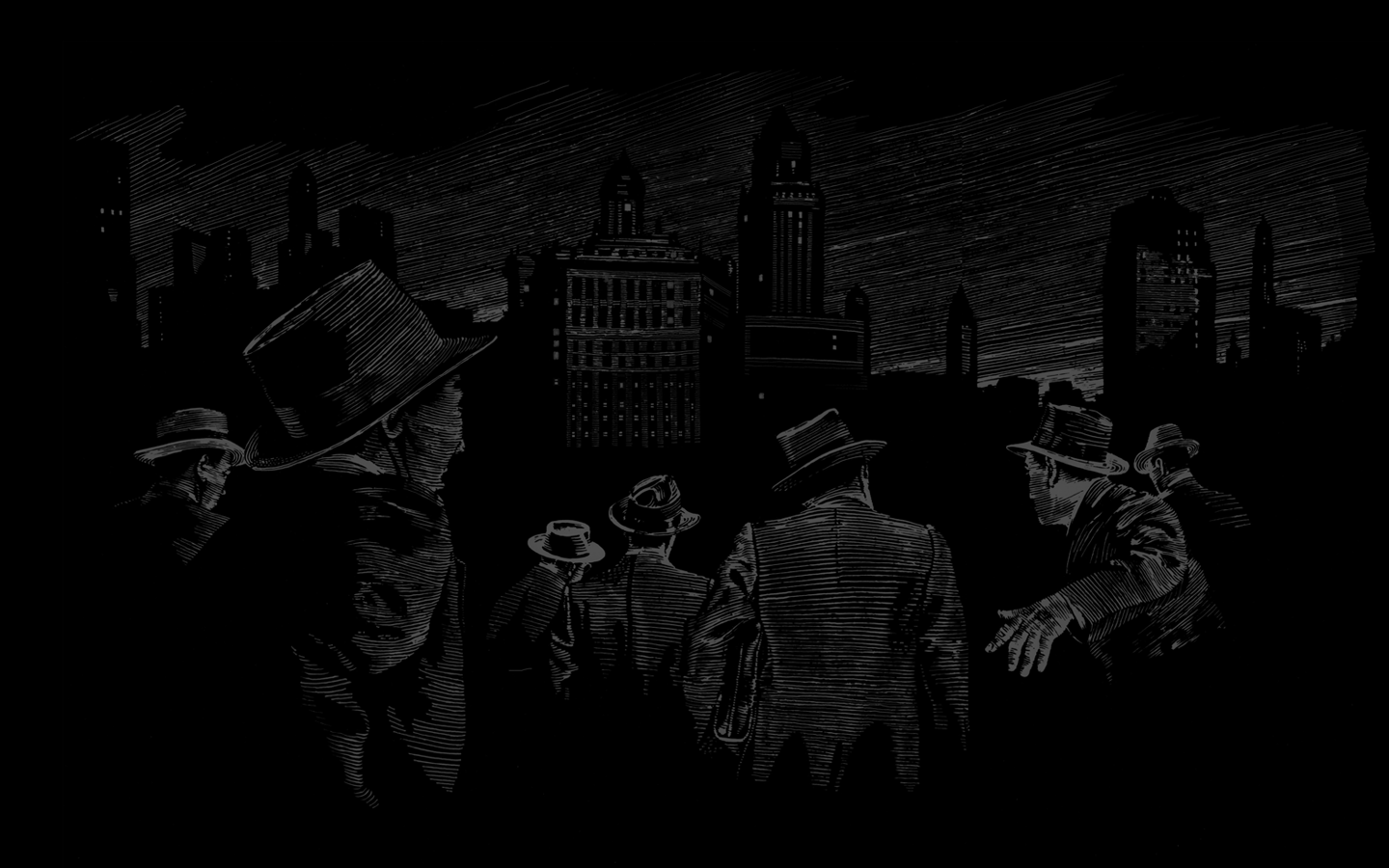
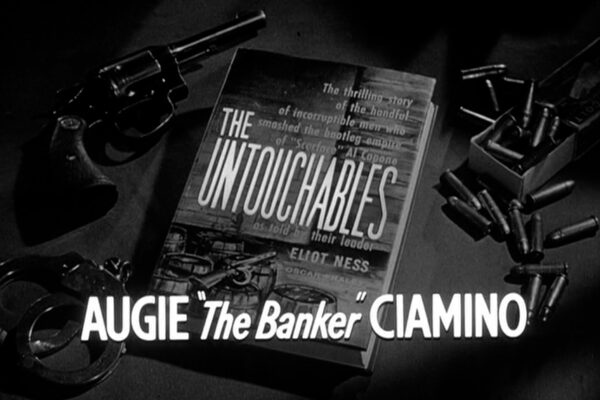
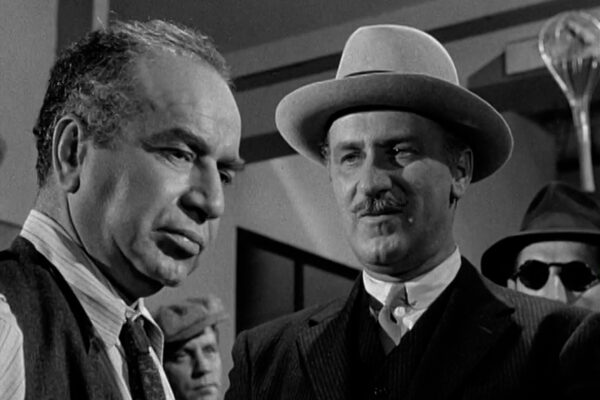
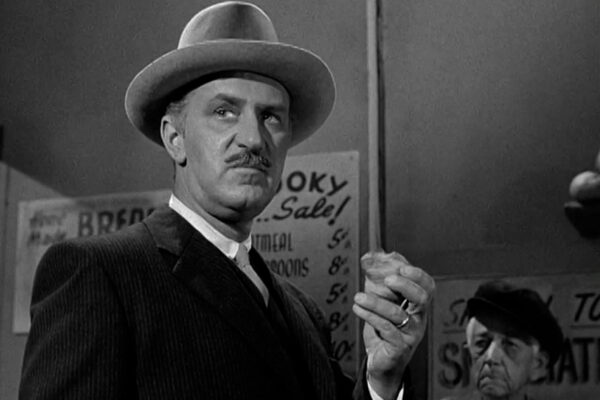

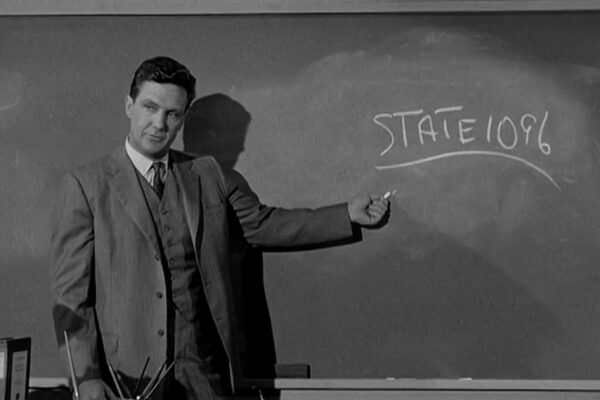

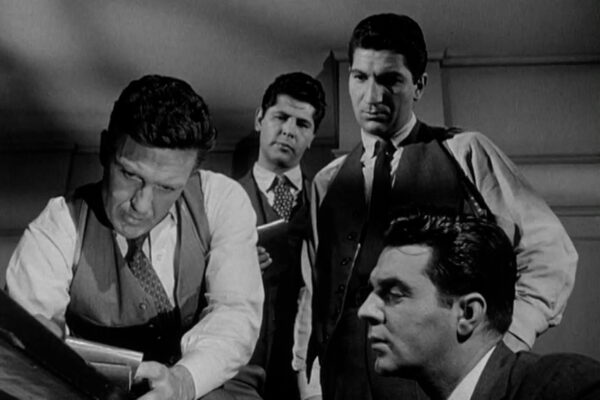
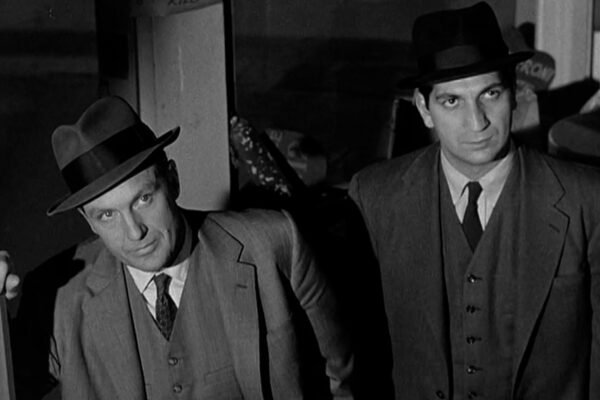
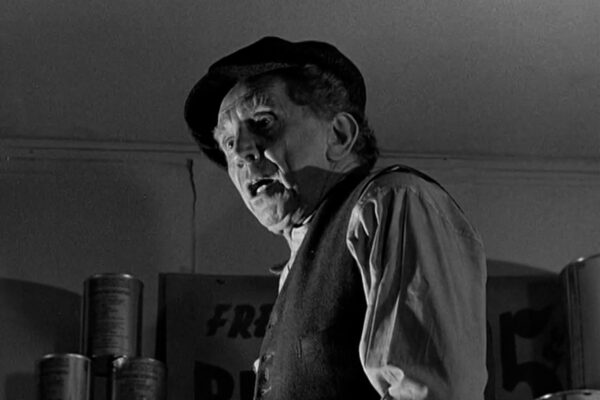
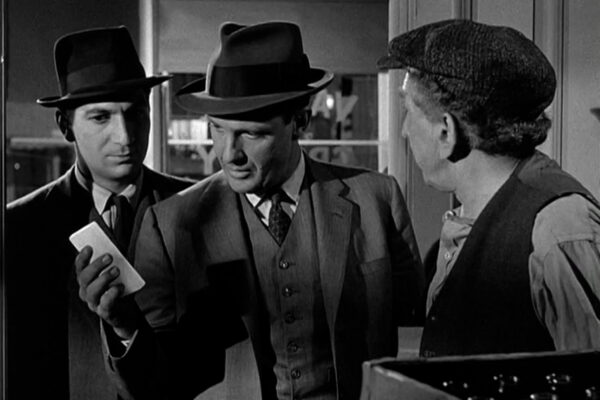
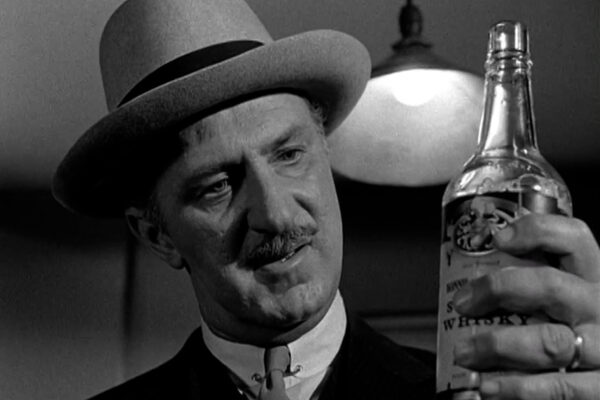
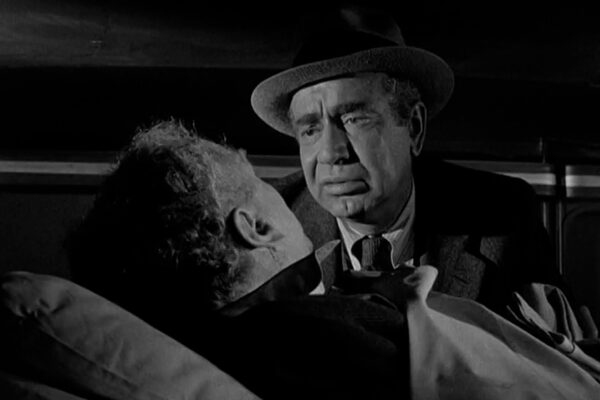
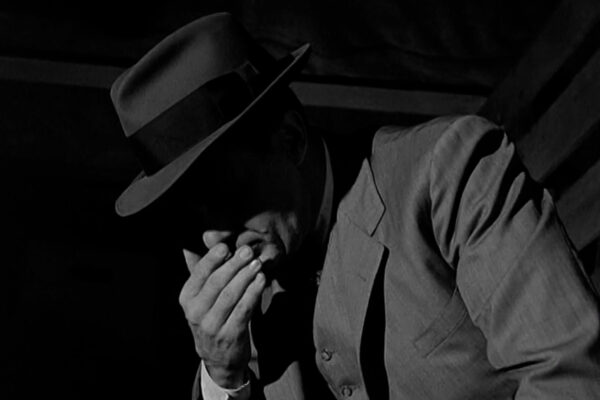
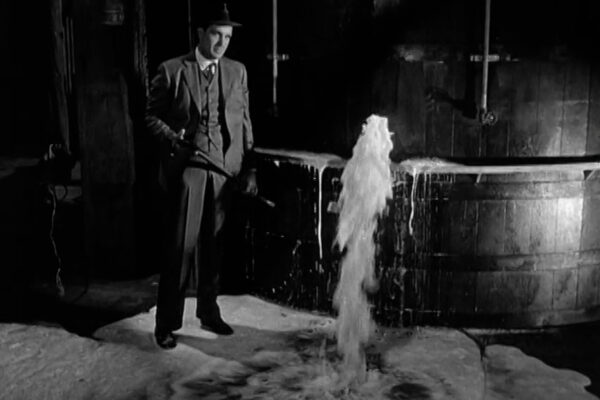
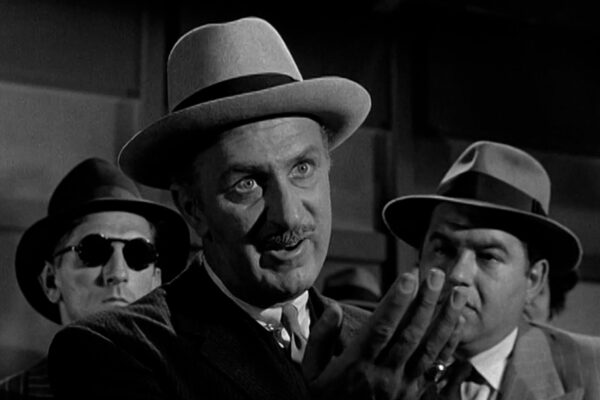
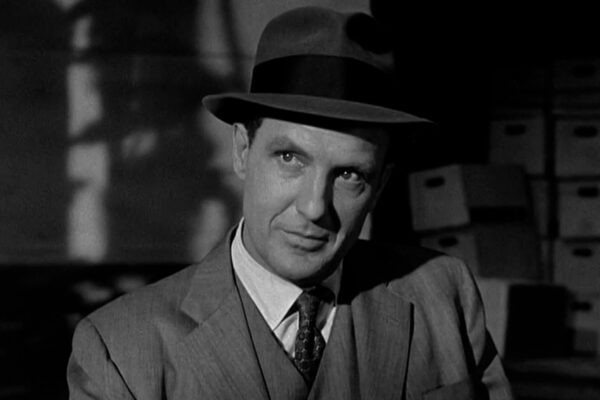
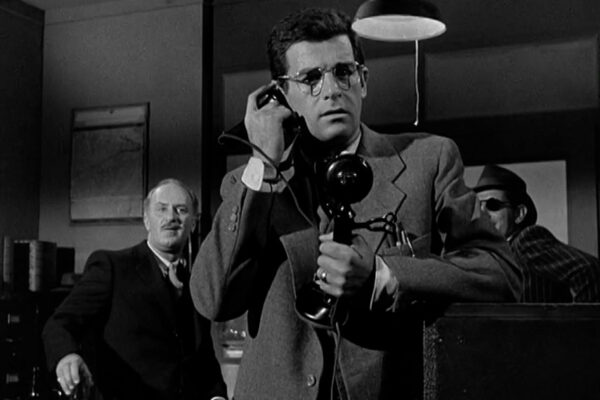
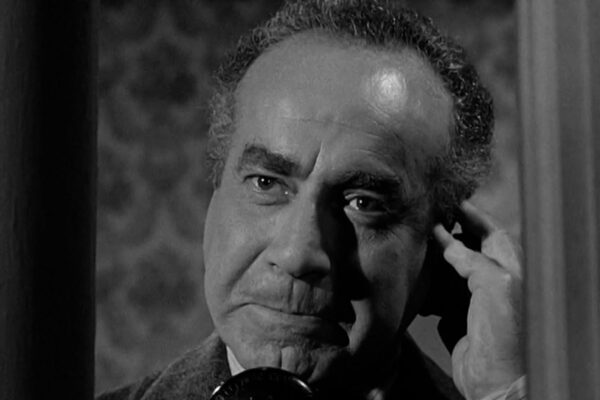
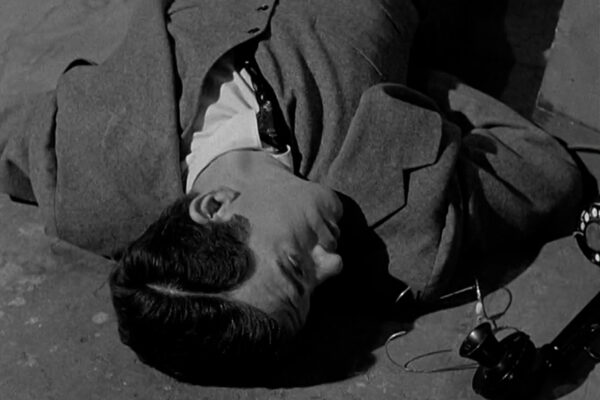
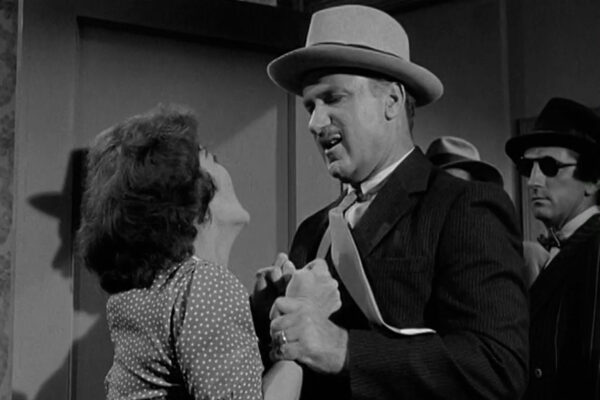
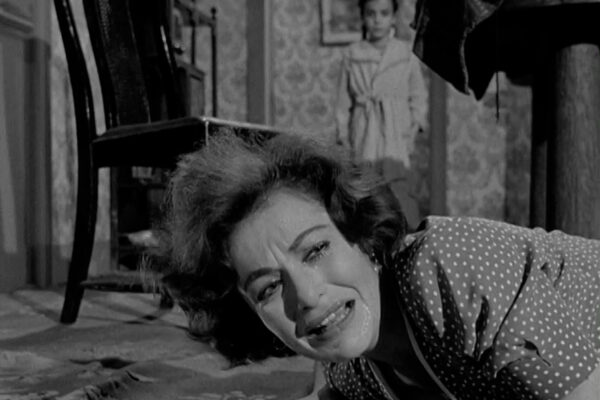

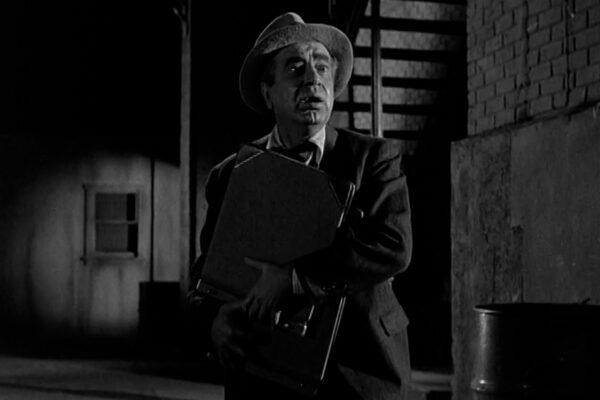

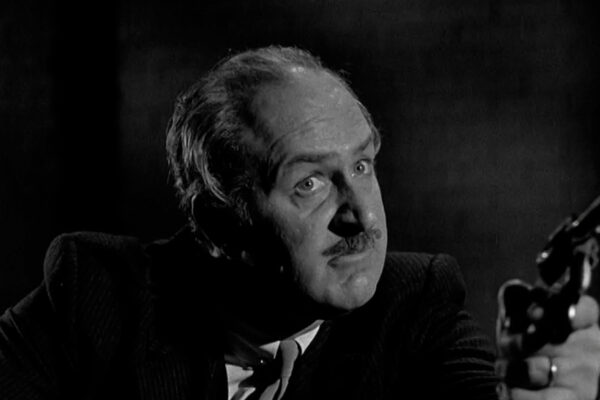
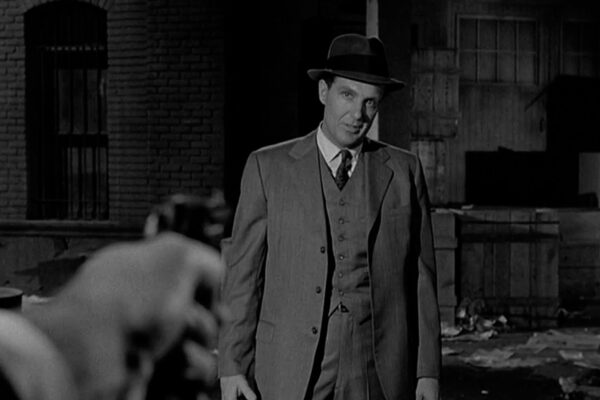
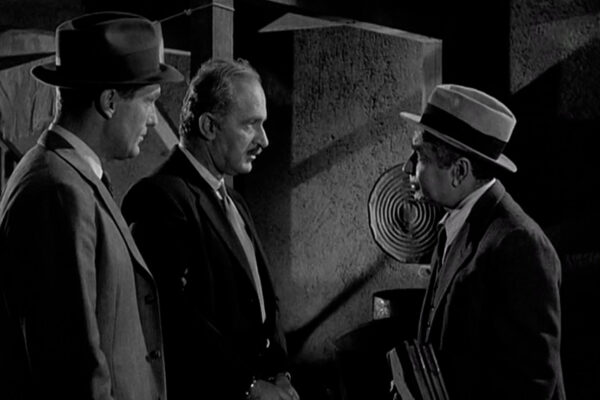



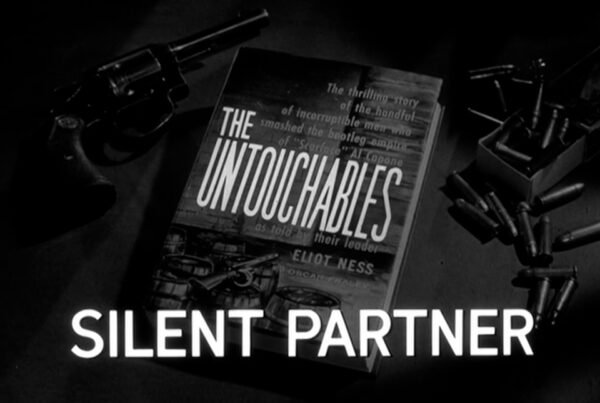
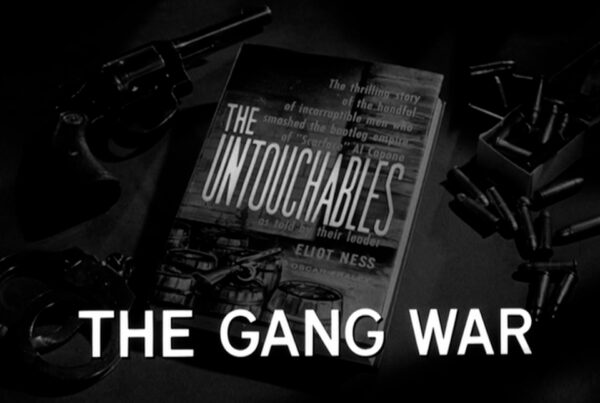
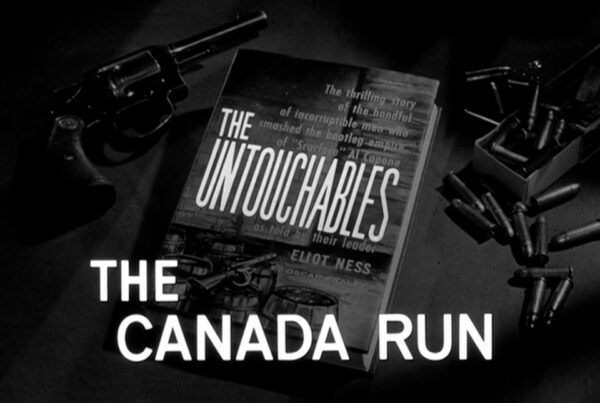
Dear Kelly,
I continue to be fascinated by all of the episodes of The Untouchables that you diligently prepare and put together. You are doing a fantastic job with all of the teasers, pictures, comments and historical information about each episode, and I am glued to the computer for all of the details. Even though I was only about 14 or 15 when I originally watched The Untouchables on TV and don’t remember the details of the shows then, you really bring them to life again with everything that you do to put them together. You are really to be commended for all of your hard work in taking the time to do this.
Although I am aware that Robert Stack unfortunately passed away a number of years ago, I am curious if his beautiful wife Rosemary is still alive? f so, did you ever meet her or talk with her? How about their children. Are they still around, and if so, have you had any contact with them? If so, they may be helpful in obtaining any further information that you would need, and they also might be interested in seeing these films with their father, if they haven’t already done so. Thank you for your information and updates. Your Nessie follower, Sheila Dorr